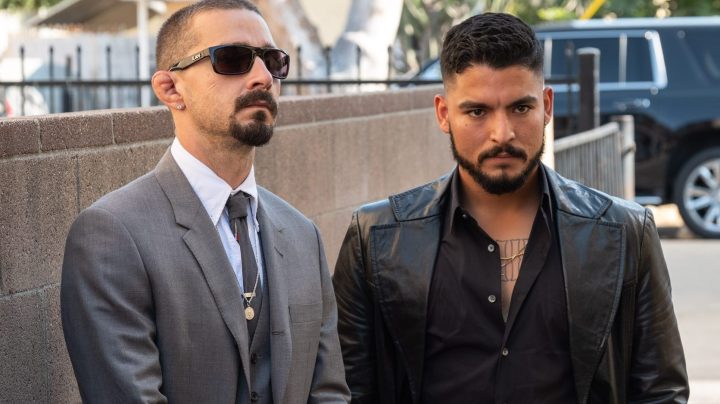Shia LeBeouf Plays a ‘Whiteboy Who Grew Up With Raza’ in The Tax Collector

Courtesy of RLJE Films.
On August 7, David Ayer’s The Tax Collector will hit movie theaters. The powers that be released the trailer on Wednesday as the nation and world slowly but surely prepare to crawl back to business as usual.
In the action, thriller film, Bobby Soto stars as David and Shia LeBeouf is Creeper—two “tax collectors” who, essentially, do crime lord Wizard’s dirty work until things take a turn and family becomes the focus. Other prominent Latinos on-set include Cinthya Carmona and George López.
Ayer, a self-identified “hood whiteboy” is at the helm of the project as both writer and director. He took to Twitter to address several comments on the film and, more specifically, LeBeouf’s casting. The Illinois native is known for his work on Suicide Squad, Bright, S.W.A.T and—the cream of the crop due to Denzel’s near-perfect running streak—Training Day. Given his approach, it’s safe to assume Ayer knew pushback was to be expected. His explanation? “Shia’s playing a whiteboy who grew up with Raza.”
In an attempt to defend the choice to cast LaBeouf for a primary role, Ayer took on a condescending and mocking tone at times, sprinkling in Spanish in his responses. Ayer claims the decision is warranted because Shia is Jewish, and the character is not a Chicano but rather a white “Cholo” and Southsider. “He grew up in the hood,” Ayer wrote of the character.

LeBeouf shined on Holes in 2003, stole the show—and some would say peaked—in Transformers (the ones with Mojo) five years later, and recently took a more personal, artistic approach with his award-winning film Honey Boy. There’s no doubting the 34-year-old’s range and near-perfect dirtbag style. We’re here for all that. But is this yet another case of taking up space?
At a time when dialogue on race and unacceptable behavior is more candid and vital, it’s great to see Ayer engage with followers’ very valid questions (albeit half-assedly); but both the premise and casting of this film are a reminder that there is still work to be done. The Chicano, gang rival trope when making decidedly Latino films is overdone, and this particular instance feels reminiscent of others like Miss Bala, which has an entirely Latinx cast with a white director as well as screenwriter. Soto deserves center stage and Shia deserves to show this new generation what’s good, but it is yet to be determined if this is it.